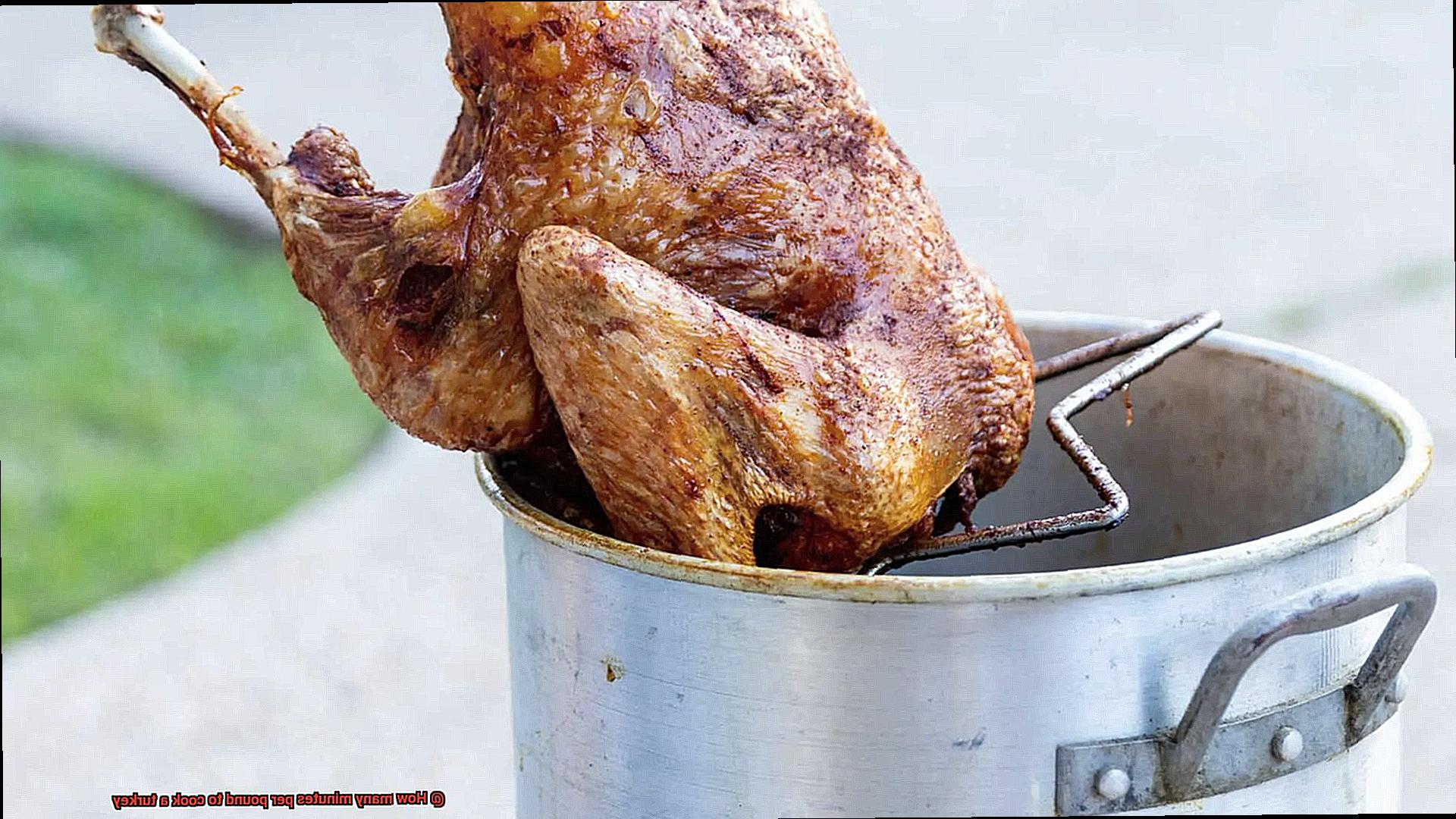Thanksgiving is almost here, and if you’re hosting this year, you know the pressure of cooking the perfect turkey. The turkey is the shining star of the Thanksgiving feast, and it’s what everyone looks forward to sinking their teeth into. That’s why nailing the cooking time is crucial. One of the most common questions that pops up every year is, “How long do I cook my turkey per pound?”
Cooking times for turkeys can be a bit tricky since they vary depending on how big your bird is. And let’s face it, no one wants to serve an undercooked turkey that could pose a health risk or an overcooked one that tastes like cardboard. So how do you figure out how long to cook your turkey? Is there a perfect formula for calculating cooking times?

As an expert in this field, I’ve taken it upon myself to answer these questions for you. In today’s post, I’ll share some insights into what factors affect your turkey’s cooking time and give you some tips on how to ensure your bird comes out juicy and delicious. By the end of this article, you’ll have all the tools you need to cook your turkey like a pro. So let’s dive in.
Contents
Factors That Affect Cooking Time
Cooking the perfect turkey can be a daunting task, but understanding the factors that affect cooking time can help alleviate some of the stress. A variety of elements, including the turkey’s weight, cooking method, and whether or not it’s stuffed, all play a significant role in determining how long your turkey needs to cook. Here’s what you need to know to cook a delicious bird this holiday season.
Weight of the Turkey
The weight of your turkey is one of the most crucial factors when determining cooking time. As a general rule of thumb, plan to cook your turkey for 15-20 minutes per pound. For example, a 15-pound turkey should take between three and four hours to cook. However, other factors can come into play, such as the shape of your turkey or your oven’s temperature control accuracy.
Cooking Method
Different cooking methods also require different cooking times and temperatures. Roasting in an oven at 325°F for 15-20 minutes per pound is the most common way to cook a turkey. But you can also grill, smoke, or deep-fry your bird. Each method requires specific temperature settings and cooking times. For instance, smoking requires lower temperatures and longer cooking times than roasting.
Stuffed or Unstuffed
Whether or not you stuff your turkey will impact its cooking time. A stuffed turkey takes longer to cook than an unstuffed one because stuffing absorbs heat from the oven and slows down the cooking process. If you choose to stuff your turkey, make sure both the stuffing and the bird reach an internal temperature of 165°F.
Other Factors
Additional factors that may affect cooking time include the shape of the turkey and altitude levels where you’re cooking. Using a meat thermometer is essential to ensure your bird has reached an internal temperature of 165°F before serving.
Roasting a Turkey in the Oven
Roasting a turkey in the oven is the quintessential way to cook this holiday classic. It’s an age-old method that has been passed down from generation to generation, and for good reason. With a few simple steps, you can create a succulent and flavorful turkey that will be the centerpiece of your holiday feast.
The first step in roasting a turkey in the oven is to preheat it to 325°F. This is an essential step because it ensures that the bird cooks evenly. Once the oven has reached the desired temperature, it’s time to prepare your turkey.
Place your turkey in a roasting pan and season it with your favorite herbs and spices. The possibilities are endless when it comes to seasoning a turkey. Whether you prefer traditional flavors like sage and thyme or want to experiment with something more adventurous like cumin or coriander, let your taste buds be your guide.
Calculating the cooking time of your turkey is crucial for achieving a perfectly cooked bird. As a general rule of thumb, plan on cooking your turkey for 13 minutes per pound. So, for example, if you have a 16-pound turkey, it should take approximately 3 hours and 28 minutes to cook. However, keep in mind that this is just an estimate, and other factors can affect cooking time.
One such factor is whether or not you decide to stuff your turkey. If you choose to stuff it, it will take longer to cook than an unstuffed one. To ensure that your turkey is cooked safely and thoroughly, use a meat thermometer to check the internal temperature. The thickest part of the bird should reach 165°F.
After removing your turkey from the oven, let it rest for at least 15-20 minutes before carving. This crucial step allows the juices to redistribute throughout the meat, resulting in a more flavorful and juicy bird.
Grilling a Turkey
As an expert on the topic, I’m here to guide you through the process of grilling a turkey, from preparation to resting.
Preparation is key when it comes to grilling a turkey. Start by cleaning the bird thoroughly, removing any giblets or excess fat from the cavity. Once clean, pat it dry with paper towels and season it with your desired rub or marinade. This step is crucial for adding that extra flavor boost that makes your turkey stand out from the rest.
Now that your turkey is ready, let’s move on to cooking. Preheat your grill by turning all burners to high heat for gas grills or lighting the charcoal until it turns white-hot for charcoal grills. Once the grill is hot, place the turkey on the grill breast-side up and lower the heat to medium-high. Close the lid and let it cook for about 10-12 minutes per pound. Keep a close eye on the bird and adjust the heat as needed to ensure even cooking without burning.
It’s important to check the internal temperature regularly using a meat thermometer. Cook the turkey until it reaches an internal temperature of 165°F in the thickest part of the bird. If needed, tent the bird with foil towards the end of cooking to prevent over-browning.
Once fully cooked, remove the turkey from the grill and allow it to rest for at least 15 minutes before carving. This step allows the juices to redistribute throughout the meat resulting in tender and juicy turkey that will impress your guests.
Internal Temperature for Safety
Grilling a turkey is a delicious way to celebrate the holidays or any special occasion. However, food safety should always be your top priority. Harmful bacteria such as salmonella can lurk in undercooked turkey, causing food poisoning and ruining your festivities. This is why it’s crucial to ensure your turkey reaches the recommended internal temperature of 165°F (74°C).
To achieve this perfect temperature, you’ll need a trusty meat thermometer. Insert it into the thickest part of the bird without touching any bones, as this can give an inaccurate reading. Don’t just check the temperature once. Make sure to check it in several places to ensure that the entire bird has reached the correct temperature. This will avoid any unwanted surprises when carving into your bird.
Cooking times may vary depending on factors like the size of the bird and whether or not it’s stuffed. As a general rule of thumb, allow 15-20 minutes of cooking time per pound of turkey. However, using a meat thermometer is the most accurate way to determine when your turkey is fully cooked and safe to eat.
Once you’ve ensured that your turkey has reached its ideal internal temperature, it’s time to let it rest for at least 20 minutes. This allows the juices to redistribute throughout the meat, making it even more tender and juicy. Trust us, this will be worth the wait.
Using a Meat Thermometer
Look no further than your trusty meat thermometer. Not only is it the most accurate way to determine when your turkey is fully cooked, but it’s also essential in ensuring that harmful bacteria are destroyed.
First things first, let’s talk turkey temperature. The internal temperature of the bird should reach 165 degrees Fahrenheit to ensure its safety for consumption. To achieve this, insert the thermometer into the thickest part of the turkey, such as the breast or thigh, without touching any bones. This will give you an accurate reading of the temperature deep inside the turkey.
But before you start cooking, make sure to test your meat thermometer for accuracy by inserting it into boiling water. It should read 212 degrees Fahrenheit at sea level. If it doesn’t, don’t fret. Simply adjust or replace it before starting your cooking process.
When it’s time to cook your turkey, insert the thermometer into the thickest part of the bird and wait for a few seconds until the temperature reading stabilizes. Then remove the thermometer from the turkey. This simple step ensures that your turkey is cooked to perfection and safe to eat.
It’s important to note that cooking times can vary depending on several factors such as size, shape, and oven type. That’s why relying on temperature rather than time is key. Using a meat thermometer takes the guesswork out of cooking your turkey and helps avoid undercooking or overcooking it.
Tips for Perfectly Cooked Turkey
Cooking a turkey can be daunting, but with the right tips and techniques, you can ensure a perfectly cooked bird every time. Timing is one of the most critical factors to consider when cooking a turkey. Undercooking it can cause foodborne illnesses, while overcooking can result in dry and tough meat. Therefore, knowing how many minutes per pound to cook a turkey is essential.
The cooking time depends on the weight of the bird. A general rule of thumb is to cook a turkey for 15-20 minutes per pound at 325°F. For instance, a 12-pound turkey would take around 3-4 hours to cook fully. However, other factors can affect the cooking time. If you stuff the turkey, it will take longer to cook. Additionally, if you’re starting with a frozen turkey, you’ll need to allow extra time for thawing before cooking.
To ensure that your turkey is perfectly cooked, it’s important to use a meat thermometer to check its internal temperature. The USDA recommends that the thickest part of the turkey (usually the thigh) should reach a minimum temperature of 165°F before it’s safe to eat.
Letting your turkey rest for at least 15-20 minutes before carving is another essential tip for perfectly cooked turkey. This allows the juices to redistribute throughout the meat, resulting in a more tender and flavorful bird.
Common Mistakes to Avoid When Cooking a Turkey
Thanksgiving is just around the corner, and it’s time to start planning that perfect turkey. However, cooking a turkey can be tricky, and many people often make mistakes that can lead to a less than perfect bird or even foodborne illnesses. Here are some of the most common mistakes to avoid when cooking a turkey:
Firstly, ensure that you give your turkey enough time to thaw properly. It’s easy to get caught up in the excitement of Thanksgiving and forget that a frozen turkey needs ample time to thaw in the refrigerator. Not giving it enough time can lead to uneven cooking and harmful bacteria growth. For optimal results, allow 24 hours of thawing time per 4-5 pounds of turkey.
Secondly, don’t forget to season your turkey. A well-seasoned turkey can elevate the taste of your meal. Be sure to generously season both the inside and outside of the bird with salt, pepper, and other herbs and spices of your choice.
Overcooking or undercooking your turkey is another mistake to avoid. Overcooked turkey can be dry and tough while undercooked turkey can cause food poisoning. The general rule of thumb is to cook the turkey for 15-20 minutes per pound at 325°F. Use a meat thermometer to ensure that the thickest part of the bird reaches 165°F before serving.
Stuffing a turkey may seem like a great idea, but it can be dangerous if not done properly. The stuffing may not reach a safe temperature before the turkey is cooked, allowing harmful bacteria to grow. Instead, consider cooking your stuffing separately.
Lastly, resist the urge to open the oven too frequently. Opening the oven repeatedly can cause temperature fluctuations, leading to longer cooking times and potentially ruining your perfectly cooked turkey. Try to resist checking on your turkey too often and only open the oven when necessary.
I_U6beaF32Q” >
Conclusion
In conclusion, the task of cooking a turkey can be quite intimidating, especially if you’re hosting Thanksgiving dinner. After all, the turkey is the star of the show and everyone expects it to be perfect. So, getting the cooking time right is crucial. One question that comes up every year is “How many minutes per pound should I cook my turkey?”
When it comes to determining cooking time, the weight of your turkey is a significant factor. Generally speaking, plan for 15-20 minutes per pound at 325°F. However, other factors such as your oven’s temperature control accuracy or the shape of your bird can affect cooking time.
There are various ways to cook a turkey – roasting in an oven at 325°F for 15-20 minutes per pound being the most popular method. But you can also grill, smoke or deep-fry your bird for a unique flavor profile.
Using a meat thermometer takes away any guesswork from cooking your turkey and helps avoid undercooking or overcooking it. It’s essential to ensure that the thickest part of the bird has reached an internal temperature of 165°F before serving.
Lastly, steer clear of common mistakes like not allowing enough time for thawing, overcooking or undercooking your turkey, stuffing it incorrectly or opening the oven too frequently.






